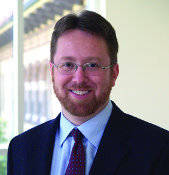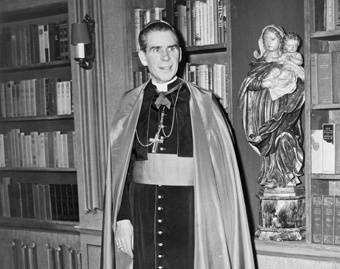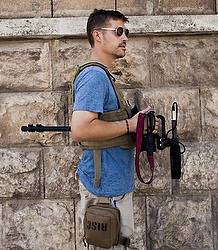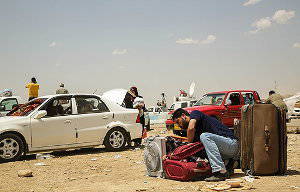Browsing News Entries
Registration deadline approaching for Assembly
Posted on 09/19/2014 11:53 AM (Diocese of Duluth | Daily News)
 This year's ninth annual Diocesan Assembly is slated for Oct. 4 at Marshall School in Duluth, and the deadline for early registration is fast approaching: Monday, Sept. 22. The featured presenter at this year's assembly is international speaker Thomas Smith, co-author of Walking Toward Eternity. Registration available here.
This year's ninth annual Diocesan Assembly is slated for Oct. 4 at Marshall School in Duluth, and the deadline for early registration is fast approaching: Monday, Sept. 22. The featured presenter at this year's assembly is international speaker Thomas Smith, co-author of Walking Toward Eternity. Registration available here.
Suspension of Fulton Sheen’s cause expected to be temporary
Posted on 09/4/2014 09:44 AM (Diocese of Duluth | Daily News)
By Elise Harris / Catholic News Agency / EWTN News — In the wake of the suspension of Archbishop Fulton Sheen’s cause for canonization due to an ownership dispute of his remains, the office promoting his sainthood says it doesn’t expect the halt to last long.
Postulator Dr. Andrea Ambrosi “has been aware of the issue regarding the transfer of Archbishop Sheen’s remains but does not believe that this will be a lasting impediment,” his office said in comments made to CNA Sept. 4.
 |
| Archbishop Fulton Sheen |
He expects “that the suspension of the cause will be temporary, since there are many people still committed to this cause and the beatification of Archbishop Sheen,” they explained. “At this point, however, he cannot give a timeframe as it depends upon negotiations between others.”
Dr. Ambrosi was chosen by the Archbishop Fulton Sheen Foundation a number of years ago to serve as the postulator for the cause, and represents it before the Congregation for the Causes of Saints.
The suspension of Archbishop Sheen’s cause was announced “with sadness” by Bishop Daniel R. Jenky of Peoria, president of the Archbishop Fulton J. Sheen Foundation, in a Sept. 3 statement published on the diocese’s website.
Explaining how the Holy See “expected that the remains of Venerable Sheen would be moved to Peoria where official inspection would be made and first class relics be taken,” the statement said that the Archdiocese of New York had denied Bishop Jenky’s request to move the body to Peoria.
“After further discussion with Rome, it was decided that the Sheen Cause would now have to be relegated to the congregation’s historic archive.”
The diocese recognized explained that Bishop Jenky was “personally assured on several occasions” by the New York Archdiocese that “the transfer of the body would take place at the appropriate time.”
“New York’s change of mind took place as the work on behalf of the cause had reached a significant stage,” the statement read, explaining how Bishop Jenky has “prayed and labored” for Archbishop Sheen’s canonization for the last 12 years.
“The Bishop is heartbroken not only for his flock in Peoria but also for the many supporters of the Sheen Cause from throughout the world who have so generously supported Peoria’s efforts.”
Dr. Ambrosi’s office explained that although “issues like this between two dioceses that lead to the suspension of a cause at this point in the process are very rare,” they believe “that this matter can be resolved.”
“Negotiations on this particular issue of the transfer of the remains of Archbishop Fulton Sheen have been handled primarily between the representatives of the Diocese of Peoria and the Archdiocese of New York,” they said.
On how the postulator has been “aware of the issue regarding the transfer of Archbishop Sheen’s remains,” the office said that he “does not believe that this will be a lasting impediment, but that the suspension of the cause will be temporary.”
In 2012, retired pontiff Benedict XVI authorized a decree that recognized the heroic virtues of the beloved host of the “Catholic Hour” radio show and the ABC television show “Life is Worth Living.”
Archbishop Fulton Sheen authored many books and headed the Society for the Propagation of the Faith. He served as an auxiliary bishop of New York and as Bishop of Rochester.
He continued to be a leading figure in U.S. Catholicism until his death in 1979 at the age of 84.
His cause for sainthood was opened in 2002. An authenticated miracle is now needed for Ven. Fulton Sheen to be beatified, the last step before canonization.
Despite the immense sadness on the part of Bishop Jenky and the Church in Peoria at the delay of Archbishop Sheen’s cause, the diocese affirmed that “saints are always made by God not by man.”
“Efforts for many causes have sometimes taken decades or even centuries. Bishop Jenky urges that those who support the Sheen Cause continue their prayers that God’s will be made manifest.”
Alan Holdren contributed to this report.
U.S. Bishops offer Labor Day statement
Posted on 08/27/2014 12:57 PM (Diocese of Duluth | Daily News)
 This year Pope Francis canonized Saint John XXIII and Saint John Paul II. Both made immense contributions to the social teaching of the Church on the dignity of labor and its importance to human flourishing. St. John Paul II called work "probably the essential key to the whole social question" (Laborem Exercens, No. 3) and St. John XXIII stressed workers are "entitled to a wage that is determined in accordance with the precepts of justice" (Pacem in Terris, No. 20). Read more >>
This year Pope Francis canonized Saint John XXIII and Saint John Paul II. Both made immense contributions to the social teaching of the Church on the dignity of labor and its importance to human flourishing. St. John Paul II called work "probably the essential key to the whole social question" (Laborem Exercens, No. 3) and St. John XXIII stressed workers are "entitled to a wage that is determined in accordance with the precepts of justice" (Pacem in Terris, No. 20). Read more >>
Black mass organizers face lawsuit over stolen Host
Posted on 08/21/2014 10:00 AM (Diocese of Duluth | Daily News)
Catholic News Agency/EWTN News — Organizers of a satanic black mass slated to take place in Oklahoma City next month face a lawsuit on grounds that the consecrated Host used for the sacrilegious event is stolen.
“We are honored to represent Archbishop [Paul] Coakley in this fight against the desecration of the Blessed Sacrament,” attorney Michael W. Caspino told The National Catholic Register. “The archbishop should be lauded for his courageous stance against the enemies of the church.”
“Our legal theory is very simple,” he continued, “a consecrated Eucharist belongs to the church.”
“The church has exercised dominion and control over the Eucharist for 2,000 years. The Satanists procured the consecrated Host by illicit means, by theft or fraud. We are simply asking the court to return the stolen property to its rightful owner, the Roman Catholic Church.”
The lawsuit was filed in Oklahoma City District Court July 20 on behalf of the local archdiocese by Busch & Caspino.
On Sept. 21, a black mass is scheduled to take place at the Oklahoma City Civic Center music hall.
Connected to witchcraft and demonic worship, a black mass is a sacrilegious ceremony structured as a parody of the Catholic Mass. Invoking Satan, the ritual is centered around the desecration of the Eucharist, which is generally done by stealing a consecrated host from a Catholic church and using it in a profane sexual ritual, or defecating and urinating on it.
The event organizer Adam Daniels said the purported Eucharistic Host was “mailed to us by [a] friend.”
“As far as I know, the host mailed to me is consecrated,” he told the Catholic news site Aleteia Aug. 6.
In July, an official with the city music hall defended the decision, citing the hall’s neutrality policy. She told CNA that as long as no laws were broken during the event itself, the city hall was not concerned with whether laws may be broken in obtaining a consecrated Host ahead of time. She said that similar events scheduled in previous years had poor or no attendance.
Archbishop Coakley of Oklahoma City has called on the civic center to reconsider hosting the event, which he described as “grievous sacrilege and blasphemy of the first order.”
Black masses, he told CNA in July, revolve around “taking what is most sacred to us as Catholics and mocking it, desecrating it, in vile, often violent and sexually explicit ways.”
“It’s obviously horrendous ... what they intend to do with that consecrated Host is offensive beyond description.”
Archbishop Coakley and other bishops in nearby dioceses have called for novenas of prayer and fasting to stop the black mass.
A similar event scheduled by Harvard Extension School’s Cultural Studies Club in May was “postponed indefinitely” amid protest among students and the local community.
Faith, prayer sources of strength for slain U.S. journalist, his family
Posted on 08/21/2014 09:55 AM (Diocese of Duluth | Daily News)
By Catholic News Service — In April 2013, the parents of slain U.S. journalist James Foley attended a prayer vigil at Marquette University in Milwaukee to pray for their son, who at that time had disappeared in Syria.
Before Diane and John Foley had confirmation that spring that their son was missing, Diane said she just felt it — he had missed one of his usual phone calls home — and once they knew for sure, the couple said they were relying on their Catholic faith to cope and leaning on prayer to bring him home.
 |
| CNS photo/Nicole Tung, courtesy GlobalPost via EPA — American journalist James Foley, who was kidnapped by unidentified gunmen in November 2012 in Idlib, Syria, is pictured in an undated photo. Foley, a freelance war correspondent from New Hampshire and Marquette University alum, was killed at the hands of the Islamic State militant group. |
“Faith has been part of family life, but this has deepened my faith because there is our hope. Our hope is that God will take care of Jim,” she told the Catholic Herald in Milwaukee at the time.
That strong faith will likely help the couple, who are members of Our Lady of the Holy Rosary in Rochester, get through the fact that their 40-year-old son was beheaded by militants with the Islamic State extremist group, known as ISIS.
According to an AP story, U.S. officials confirmed a graphic video released Aug. 19 that showed ISIS fighters beheading Foley, a 1996 graduate of Marquette who had been a freelance journalist for the past several years, mostly in the world’s trouble spots. In 2011, he was kidnapped on a Libyan battlefield and held captive in Tripoli for 45 days.
Sometime in late 2012, he went missing in Syria. The last time the Foley family heard from him was before Thanksgiving that year.
A statement about his death attributed to Diane Foley was posted on a Facebook page originally set up to urge James’ release. Family members “have never been prouder of him,” it said.
“He gave his life trying to expose the suffering of the Syrian people,” the statement said, which also urged the militants to release others they are holding hostage. “Like Jim, they are innocents. They have no control over American policy in Iraq, Syria or anywhere in the world.”
ISIS said they killed James Foley in retaliation for U.S. airstrikes on the militants’ strongholds and the group said it would kill another U.S. hostage.
News of his grisly death has sent shock waves around the world, eliciting prayers and statements of support for the family from Catholic leaders, the Marquette community, reporters’ organizations, fellow journalists and many others.
“The brutality of this act is itself evidence of an unspeakable evil that is rampant and inhuman,” New Hampshire Bishop Peter A. Libasci of Manchester. “To the prayers that have been offered since his captivity almost two years ago, we now add our prayers for James’ eternal rest and, in Christ Jesus Our Lord, James’s future resurrection to eternal life.”
“Our prayers also must accompany a sorrowful mother, a grieving father, a deeply pained family and countless friends who have kept vigil all this time,” he said. “May we also pray for those who have embraced the way of darkness and death, that they may turn away from this terrible evil now and forever.”
News reports said the Foleys’ pastor, Father Paul Gousse, was at the family’s house for about 45 minutes Aug. 19. He left without speaking to reporters. The parish posted a notice that the church would be open to all to join in prayer for Jim, his family, friends, colleagues “and all who are still in danger.”
Besides Facebook, his family has been using Twitter and other social media to express their sorrow and ask for privacy.
In her statement on Facebook, Diane Foley said: “We thank Jim for all the joy he gave us. He was an extraordinary son, brother, journalist and person. Please respect our privacy in the days ahead as we mourn and cherish Jim.”
James’ sister, Kelly, took to Twitter asking others not to watch the video that shows his beheading: “Please honor James Foley and respect his family’s privacy. Don’t watch the video. Don’t share it. That’s not how life should be.”
Twitter CEO Dick Costolo said on Twitter that anyone sharing the images of the event would have their accounts suspended. “We have been and are actively suspending accounts as we discover them related to this graphic imagery. Thank you.”
In 2011, after he was let go by his kidnappers in Libya, James Foley wrote an article for Marquette magazine on how prayer, specifically the rosary, got him through captivity in a military detention center in Tripoli.
He had been captured with two colleagues, he said. “Each day brought increasing worry that our moms would begin to panic. My colleague, Clare, was supposed to call her mom on her birthday, which was the day after we were captured. I had still not fully admitted to myself that my mom knew what had happened. But I kept telling Clare my mom had a strong faith.
“I prayed she’d know I was OK. I prayed I could communicate through some cosmic reach of the universe to her.”
Foley began to pray the rosary.
“It was what my mother and grandmother would have prayed. I said 10 Hail Marys between each Our Father. It took a long time, almost an hour to count 100 Hail Marys off on my knuckles. And it helped to keep my mind focused,” he wrote. “Clare and I prayed together out loud. It felt energizing to speak our weaknesses and hopes together, as if in a conversation with God, rather than silently and alone.”
Foley also describe his experience at Marquette University, which he said “has always been a friend to me. The kind who challenges you to do more and be better and ultimately shapes who you become.” He added that Marquette had never been “a bigger friend to me than when I was imprisoned as a journalist.”
Marquette posted a link to his article along with a statement about his death on the university’s website: news.marquette.edu.
“The Marquette community is deeply saddened by the death of alumnus and freelance journalist James Foley,” the university’s statement said. “We extend our heartfelt prayers and wishes for healing to James’ family and friends during this very difficult time.”
James Foley had majored in history at the Jesuit university, then enrolled at Medill School of Journalism at Northwestern University and earned a master’s degree in 2008.
“(He) had a heart for social justice and used his immense talents to tell the difficult stories in the hopes that they might make a difference in the world — a measure of his character for which we could not be prouder,” the Marquette statement said.
A campus prayer vigil to remember Foley and to support his family was scheduled for Aug. 27 on campus.
Diocesan Assembly
Posted on 08/19/2014 15:57 PM (Diocese of Duluth | Daily News)
The Diocese of Duluth’s ninth annual Diocesan Assembly will be held Saturday, Oct. 4, at the Marshall School auditorium in Duluth. The speaker will be Thomas Smith from Ascension Press on “Walking Toward Eternity: Making Choices for Today.” Participants will learn to grow in their relationship with Jesus Christ through the daily exercise of love, faithfulness and prayer. Smith, a former Protestant minister, is an international speaker and a guest on EWTN and Catholic radio. This is a day to gather with the bishop and others from throughout the diocese to grow in faith and to become better equipped to hand the faith on to others. All are invited to attend.
Teachers, catechists, parish staff and parish leaders are especially encouraged to participate. Registration deadline is Sept. 22. Registrations after Sept. 22 are not guaranteed lunch and materials. Visit the diocesan website for registration fees. Registration is open at www.dioceseduluth.org. Contact Annette Merritt at (218) 724-9111 for more information. Marshall School is handicapped accessible.
Pope Francis asks prayers for relatives killed in car accident
Posted on 08/19/2014 15:55 PM (Diocese of Duluth | Daily News)
Catholic News Agency/EWTN News — The Holy See announced Tuesday that Pope Francis has asked that the faithful join him in praying for the repose of the souls of three members of his family who have been killed in a car accident.
“The pope was informed of the tragic accident in Argentina involving some of his family, and is profoundly saddened,” said Father Federico Lombardi, Holy See press officer, Aug. 19.
“He calls upon all who share in his grief to be united with him in prayer.”
Pope Francis’ nephew, Emanuel Horacio Bergoglio, 38, was returning to Rosario from a weekend with his family in the mountains near Cordoba, in central Argentina.
Their Chevrolet Spin hit a truck carrying corn.
Emanuel is in the hospital of Villa Maria in critical condition. His wife, Valeria Carmona, 39, died, along with their children, Jose, 2, and Antonio, 8 months.
The pope’s nephew is the son of his late brother, Alberto.
Catholic groups unite to help Iraqis ousted by extremists
Posted on 08/8/2014 10:47 AM (Diocese of Duluth | Daily News)
Andrea Gagliarducci/Catholic News Agency — Catholic Relief Services and Caritas have agreed to a common plan to help those who have fled from their homes in the portions of northern Iraq now controlled by the Islamic State.
The militant organization Islamic State of Iraq and the Levant was among the rebels fighting in the Syrian civil war; this spring it spread its operations to Iraq, taking control of Mosul and swaths of territory in the country’s north and west. It has now declared a caliphate, and calls itself the Islamic State.
 |
| A man leaves his car and packs his bag at the Khazair checkpoint after fleeing from Mosul, Iraq on June 11, 2014. Credit: R. Nuri UNHCR-ACNUR via Flickr (CC BY-NC-SA 2.0) |
All non-Sunni persons in the Islamic State have been persecuted – Christians, Yazidis and Shia Muslims have all fled the territory.
In response to the crisis, Catholic Relief Services – the U.S. bishops’ international charity arm – and Caritas have identified short- and medium-term priorities to help minorities, most of them Christian, who have fled the Islamic State, after conducting a survey of 25 displaced families staying in schools, churches, empty houses, with host families, and in rental accommodations.
“Most are uncertain about the future but do not see themselves returning home any time soon,” said Kris Ozar, head of programming for CRS Egypt, in an Aug. 4 interview with CNA.
“The level of psychological trauma is high, especially among minorities, who were more directly targeted by the violence.”
Thousands of Christians and other minorities fled Mosul after a July 18 ultimatum demanding they convert, pay jizya or be killed. They went to other towns in Nineveh province and in Iraqi Kurdistan.
Many were stripped of their possessions at Islamic State checkpoints, escaping with nothing but the clothes on their backs.
“Many of these families had first fled Mosul in June but recently returned under the impression that it was safe to do so, making the latest displacement even more traumatic,” Ozar said.
“Humanitarian conditions in the country continue to deteriorate,” he said, adding that “population displacement is widespread but highly fluid, with little reliable data on overall numbers at any time.”
“With CRS and Caritas Germany co-funding, Caritas Iraq responded to the Mosul crisis by distributing essential food and non-food items to 2,000 displaced families by the end of June,” Ozar said.
The package included 10 days worth of food and essential bedding and hygienic supplies.
“In response to the new wave of displacement from Mosul in mid-July, Caritas Iraq distributed a similar package of food and non-food assistance to another 400 newly displaced partners.”
As a result of the survey of displaced families, CRS and Caritas decided to focus immediately on education and psychosocial activities for internally displaced children, in addition to ongoing relief for new arrivals.
“The Ministry of Education requested immediate assistance to ensure that all children are able to take their end of year exams in mid-August” since many children have “missed weeks or months of school and need help to catch up on their classes,” Ozar said. “So CRS and Caritas will help students at grades 9 and 12 to catch up on their classes before the exams.”
The assistance to children will also include psychosocial support and healing, given the scale of emotional trauma suffered.
In the heavily affected areas of Nineveh province, CRS and its partners are working to reach as many as 3,500 families with food, water and essential living supplies.
“With people on the move and robbed of their belongings, many have no means to purchase the basics just to get by.”
Caritas and CRS are also preparing to support longer-term resettlement with winterization, shelter and livelihood support.
In addition to the assistance offered by CRS and Caritas, Aid to the Church in Need has donated $134,000 to the church in Iraq; the Congregation for the Oriental Churches has sent $50,000; and the Pontifical Council Cor Unum gave $40,000.
Inhabitants of Mosul who have fled to other locations in Nineveh province, such as Bakhdida, lack drinking water, electricity and medicine, the Islamic State having cut off their supplies.
On Aug. 3, the Islamic State took control of Sinjar, a Yazidi-majority town fewer than 80 miles west of Mosul. The Yazidi are an ethno-religious minority, most of whom live in Nineveh province. Much of the town’s population of 20,000 have abandoned their home for Dohuk province, part of Kurdistan.
New deacon leader knows his way around program
Posted on 08/8/2014 10:30 AM (Diocese of Duluth | Daily News)
By Kyle Eller/The Northern Cross — For the first time in about three decades, there is a new face at the helm of the deacon formation program for the Diocese of Duluth. Deacon John Weiske took over the role this summer after Deacon David Craig retired from the position July 1. Read more >>
Bishop Paul Sirba: A lost sense of responsibility?
Posted on 08/6/2014 14:01 PM (Diocese of Duluth | Daily News)
| Bishop Paul Sirba |
Congress is nearing the end of its term and, as of yet, has not enacted a comprehensive immigration reform package that creates a roadmap to citizenship for the nearly 11 million undocumented people in the U.S. Compounding the issue is the current humanitarian crisis at the U.S./Mexican border with the influx of unaccompanied children, some as young as 5 years old, in search of safety from the violence plaguing their countries of origin.
I urge the northeastern Minnesota community to join me in a passionate plea to our elected officials for reasoned, compassionate action. We must remind them that fixing the U.S. immigration system, as well as the border crisis, is a moral imperative that is immediately necessary to meet the needs of our country and the needs of our aspiring citizens. Read more >>
